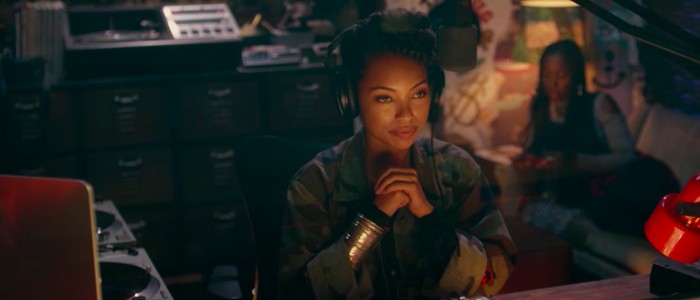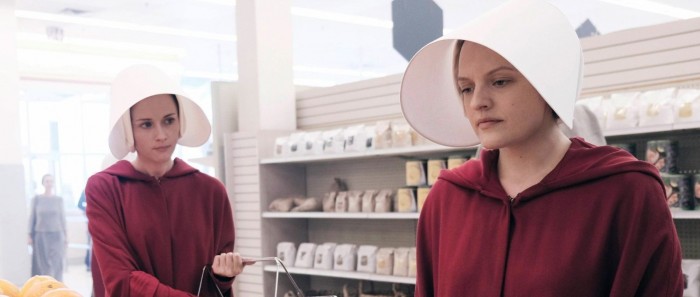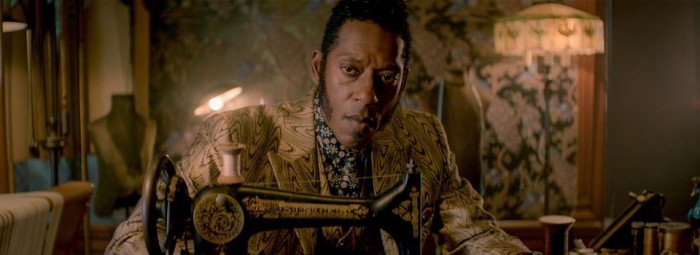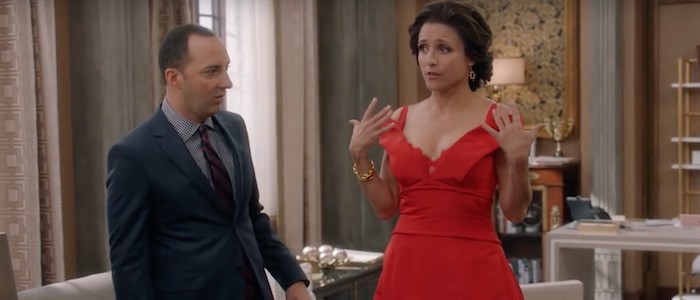'The Handmaid's Tale,' 'American Gods' And The Rise Of Newly Relevant TV Shows In Trump's America
(Welcome to The Soapbox, the space where we get loud, feisty, and opinionated about something that makes us very happy...or fills us with indescribable rage. In this edition: the rise of political television in the wake of Donald Trump's presidency.)
It started with Nazi symbols strewn across public transportation and billboards across D.C. and New York. No, it wasn't the alarming rise of anti-Semitic vandalism that had skyrocketed in the first three months of the Trump administration. It was advertising The Man in the High Castle, the dystopian Amazon series based off the 1962 Philip K. Dick novel set in an alternate 1960s where the Axis powers won World War II.
And it was just the beginning in a recent surge in "newly relevant" and timely TV shows that took on new meaning after the election of Donald Trump to the White House. The Man in the High Castle kicked off a spate of fictional TV shows such as The Handmaid's Tale and American Gods, whose stories were conceived long before the White House was even a glimmer in Trump's eye. But these science-fiction and fantasy stories, at first cautionary or highly theoretical tales, now take on an eerie prescience as fiction and reality collide on the small screen.
The Man in the High Castle: The First Unintentionally Timely Show
The widespread ads for The Man in the High Castle unnerved a great deal of people when Amazon first launched the bold marketing campaign in 2015 for obvious reasons — much as we wish it weren't true, anti-Semitism and Holocaust denial is alive and well in this country — but the ad blitz for the second season of The Man in the High Castle enraged people for a curiously different reason.
Supporters of President Trump were upset over the existence of the "Resistance Radio" — what they mistook for an anti-Trump radio station launched by the group of people unhappy with Trump's November 8 election win. In reality, it was a fake Internet-based radio station set up to advertise The Man in the Castle, named after the fictional American "Resistance" from the show.
Trump supporters could be somewhat forgiven for mistaking the advertising for actual calls to resist the president. Trump critics had initially called themselves #TheResistance on social media, styling themselves after another dystopian novel, The Hunger Games. And before Amazon launched this campaign, a few anti-Trump podcasts had used the hashtag #ResistanceRadio. But most notably, Trump supporters were quick to defend a president who had frequently been associated with white supremacist and Nazi groups — and had been slow to denounce their support of him during his campaign. The irony that Trump's supporters were fruitlessly defending him against a fake radio station advertising a TV series in which Nazis had taken over the U.S. government was not lost on fans of the show.
"The show, like Dick's novel, is most provocative when it shows Americans adapting to fascism with an alarming smoothness," The New Yorker observes about The Man in the High Castle's newfound timeliness. "For those not targeted for elimination, the show suggests—for nice young white men like Joe Blake in particular—the American Reich would not be terrifying at all. It might, in fact, look a lot like the America we already know."
The Most Politically Relevant Shows Today Are Old Stories
Now, two television adaptations of books written years before the 2016 take up the mantle of "newly timely TV" from The Man in the High Castle: The Handmaid's Tale and American Gods.
The Handmaid's Tale drew the most attention for its depiction of a not-too-distant future in which the government has sanctioned the systemic rape of women. While that sounds like an implausible future, author Margaret Atwood actually drew much from the past when she wrote the book in 1985. Basing the oppressive fundamentalist government of Gilead off of totalitarian regimes in history — from the Bolsheviks, to the Soviet Union, to Communist China, to militant Islamic states — as well as the U.S.'s own Puritanical roots, Atwood set out to tell a realistic story in which "the United States had suffered a coup that had transformed an erstwhile liberal democracy into a literal-minded theocratic dictatorship."
But perhaps it was too real for comfort. Though her book was based on very real backlash to the second-wave feminism in the '70s and the rise in sexual assault and the anti-porn campaign in the '80s, The Handmaid's Tale still presents a relevant commentary on feminism, especially concerns with "rape culture" that has arisen in the past few years, and issues of birth control and abortion. A chilling scene in the first episode of the Hulu series starring Elisabeth Moss (see my review here), shows a group of women ordered to slut shame a woman who was gang raped, in what is essentially a re-education camp.
Fears over government control of women's bodies are ongoing issues today, with abortion and reproductive laws continually making their ways through state and federal legislatures. And let's not forget the uncertainty surrounding the protection of health services like pregnancy and maternity care, which under the Republican Party's new American Health Care Act, could be deemed an unprotected pre-existing condition. The control of women, their bodies, and their babies "has been a feature of every repressive regime on the planet," Atwood says in her New York Times op-ed about the new relevance of her story.
The political message of American Gods, written by Neil Gaiman in 2001, is a little less clear than that of The Handmaid's Tale, but it doesn't make it any less powerful. A modern-day fantasy series in which an ordinary man gets embroiled in a war between Old Country gods and the new gods of technology and media, American Gods is ostensibly a story about the immigrant experience, and the melting pot that America has become through the mixing of cultures and their deities. Shadow (Ricky Whittle) himself, described in the book as vaguely mixed race, is explicitly black in the show — something that American Gods addresses head-on in a harrowing lynching scene at the end of the first episode.
The opening scene of the second episode leans even harder into the story's themes of the suffering of minorities in a strange New World. Orlando Jones' Mr. Nancy gives a stirring and enraging monologue to the prisoners on a slave ship, describing to them their fate as the ancestors of a race that would be oppressed for hundreds of years — first through slavery, then through the law, drugs and police brutality. Written and filmed while Black Lives Matter was in a tense stand-off with police in Toronto, where the show was being filmed, the scene — which didn't appear in the books — set the tone for a new, politically assertive version of American Gods, which "at its heart, a book about immigrants," Gaiman says.
"Particularly as an immigration story," showrunner Bryan Fuller says on the show's unlikely reflection on modern day, "since both the Trump election and Brexit were platforms of anti-immigration and fear of the other and exploiting that fear in citizens, it feels like we are inadvertently tapping into a conversation that we need to have and continue to have as we figure out a way to celebrate differences and not condemn them."
Each of the episodes of American Gods will deal with more forlorn and forgotten communities in America, many descended from immigrants — such as the former Queen of Sheba Bilquis, brought down by men who feared her power, or the violent Slavic deity Czernobog, who finds his old way of life superseded by new inventions.
And while the show has mainly dealt in fantasy figures, vast swathes of the novel deal with poor, rural, small town Americans — in other words, Trump's America. Gaiman has said that he wrote the book in order to see bits of America that aren't shown in film or TV — a part of America we're being seeing more of now that the election has exposed an underserved demographic.
The creators of the show couldn't have known the prophetic nature of their stories that would soon play out across America. The stories were decades old, written as meditation on history or speculation about the future. But history is cyclical, and perhaps we're seeing a reflection in these new adaptations of older stories through our own history.
"Is 'The Handmaid's Tale' a prediction?" Atwood ponders. "Let's say it's an antiprediction: If this future can be described in detail, maybe it won't happen. But such wishful thinking cannot be depended on either."
What About Actual Political Shows?
Shows about Washington itself struggle to maintain that balance between absurdity and reality — their once-satirical plot points now too close for comfort. While accepting the Emmy for Best Actress this year, Veep star Julia Louis-Dreyfus joked, "Our show started out as political satire, but it now feels more like a sobering documentary."
Political shows like Veep and House of Cards have lost their punch, if only because Washington itself has become so much like the heightened reality that used to only exist on the small screen.
Like many of the aforementioned shows, Veep expected Hillary Clinton to win on November 8. But unlike those previous series, much of Veep's story depended on being a counterpart to a Clinton presidency — and now with Trump and his equally absurd staff in the White House, Veep has been defanged.
"Veep wanted to be in conversation with a Clinton presidency, but not directly," Slate posits in its review of the current sixth season of Veep. "Selina would have served as a kind of alt-Hillary, a ball of resentment, confusion, and genuine grievance, relegated to the outskirts of politics, running a corrupt foundation with her walking erection of an ex-husband, turning Veep into a hilariously deflating counterfactual about the Clinton administration."
House of Cards too, with its cunning but frustratingly incompetent president (Kevin Spacey) and seeming high stakes, now no longer seems quite as extreme now that Trump — whose nebulous ties to Russia and less-nebulous accusations of sexual assault — sits in the Oval Office.
Comedies Are the Best and Most Potent Medicine
Meanwhile, comedies are flourishing in Trump's America, using their lighthearted tone to unsuspectingly deliver alarming messages about immigration, racial profiling and more. The first to do this was Black-ish, which offered a raw reaction to the historic November election, tying in black Americans' history of oppression and their expectations for disappointment.
And then there are show like Jane the Virgin, which has consistently addressed issues of illegal immigration but has upped the ante recently; Brooklyn Nine-Nine, which addressed the issue of racial profiling from both the police and victims' side; and Superstore, which frequently tackles hot-button issues like gun violence, undocumented immigrants, and labor strikes.
Dear White People, originally a farcical satire as a 2014 film, is now a cutting reflection of reality — first sparking protests of "reverse racism" (not a thing) when the show was picked up by Netflix, then using the longer format to better explore campus racism and "safe spaces." The show kept the film's witty, light tone up until the fifth episode, which dealt with the everyday danger many young black men have to deal with: a law enforcement officer with a gun. The powerful episode directed by Oscar winner Barry Jenkins (Moonlight), was game-changing, forgoing the show's own "safe space" of humor and levity for a silent stand-off that echoed the tragic deaths of Tamir Rice or Mike Brown. And it was a story that Dear White People creator Justin Simien had been wanting to tell since he directed the 2014 film. TV gave him another medium and another chance to do that.



